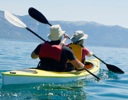
Coast Guard Issues Fair Weather Boating Warning
As sunny skies and spring-like temperatures in the northeast cause inland ice covers to rapidly subside, the beck and call of open water is strong for many small boaters, paddlers, and fishers. However, the U.S. Coast Guard’s advice is to ignore that call unless properly attired in a dry suit or wet suit, wearing a USCG-approved life jacket and prepared in all respects in the event of capsizing or falling overboard.
With coastal water temperatures just a few degrees above freezing and inland waters even colder in the First Coast Guard District, the lure of spring-like weather creates a deceptively dangerous combination, USCG noted.
"At this time of year, on unprotected flesh, the debilitating effect of the shock of cold water, is mercilessly unforgiving," said Al Johnson, the recreational boating specialist for USCG's First District in Boston. "And, I can’t stress enough, if you’re not fully prepared and properly equipped, don’t go."
The First Coast Guard District suffered its first recreational boating fatality for 2010 during the final weekend in February when a canoe carrying three people capsized on the Exeter River in Raymond, N.H., resulting in the death of a 21-year old Salem, N.H., woman. No one was wearing a life jacket, USCG said.
The Coast Guard highly recommends to those who do venture out on inland and coastal waters at this time of year to adhere to the following guidelines:
- Know and understand the danger of cold water immersion -- be aware of and prepared for the shock of sudden immersion and the incapacitating effects of cold water.
- Assess the risk -- be realistic about what can go wrong and be fully equipped and prepared to survive. This includes having a VHF radio on coastal waters, cell phone in water-proof bag, and appropriate signaling and sound-producing devices.
- Leave a float plan with a responsible individual who knows your intentions, location, and who to call if you fail to return as scheduled.
- In addition to wearing a dry suit or wet suit, wear a Coast Guard-approved life jacket and ensure that your boating or paddling partners do the same.
Johnson reminds paddlers that life jacket wear is mandatory on Massachusetts and Connecticut waters through mid-May and in Maine on the Saco River between the Hiram Dam and the ocean through June 1. Life jackets are required for all boaters and paddlers in New York on all vessels under 21 feet through May 1. Johnson recommends boaters and paddlers who have not already done so to take a boater education course through the Coast Guard Auxiliary, U.S. Power Squadrons, or with state, private, or Internet providers. Additional course information can be obtained by calling the BoatUS Course Line at 1-800-336-BOAT or visiting the following Web sites: U.S. Coast Guard Auxiliary -- www.cgaux.org; U.S. Power Squadrons -- www.usps.org; U.S. Coast Guard Office of Auxiliary and Boating Safety -- www.uscgboating.org; and National Association of State Boating Law Administrators -- www.nasbla.org.